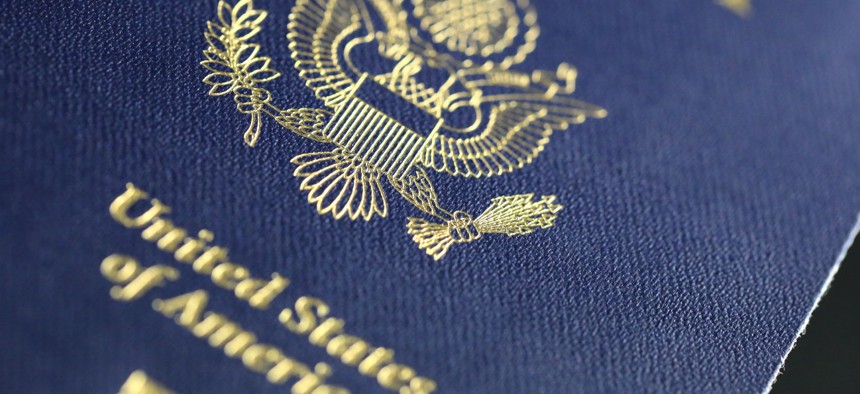
Wait times are unlikely to get worse, or better. Douglas Sacha / Getty Images
Passport Processing Remains Strained Despite Record Pace and a Hiring Spurt
The State Department cannot give an estimate for when the outlook will improve.
The State Department’s approach of surging staff and spiking overtime to address passport backlogs has led to a record-setting pace in processing for the documents, but the agency conceded to lawmakers on Wednesday that it remains well behind acceptable levels.
State will likely shatter its record-breaking 22 million passports processed in fiscal 2022 by as much as 15%, Rena Bitter, State’s assistant secretary for the Bureau of Consular Affairs, told the Senate Foreign Affairs Committee. Its staff has grown by 10% so far this year, with another 10% bump currently waiting in the pipeline. Still, passport processing is taking between 10 and 13 weeks, which members of both parties said was far too slow. Bitter suggested still more staffing would be required to pick up the pace.
In addition to the new staff, Bitter noted State has authorized between 30,000 and 40,000 hours of overtime per month to keep up with the onslaught of post-pandemic passport requests. It has recruited volunteers, including among State retirees, and assigned new Foreign Service Officers to address the situation. The department mandated overtime in 2017 and kept it in place for several years before the pandemic slowed travel, then reinstituted it in 2021 when the average wait time grew to 18 weeks.
Demand has skyrocketed in recent years: 46% of Americans now have passports, up from 30% in 2008 and just 5% in 1990. The rush for Americans looking to travel abroad coincided with a downturn in capacity within the Bureau of Consular Affairs. The largely fee-funded agency saw a 50% decline in revenue during the pandemic, though Congress eventually intervened to provide a cash infusion. That kept the bureau from laying off staff, Bitter said, but it still instituted a hiring freeze. It did not begin bringing on new staff again until January of 2022.
State—which has seen the largest growth in the permanent civil service workforce of any department under the Biden administration—has requested $100 million in fiscal 2024 for hiring, which Bitter said would backfill vacancies and add 300 new positions. While Sen. Bob Menendez, D-N.J., who chairs the Foreign Affairs Committee, pledged to help get the bureau the resources it needs, fulfilling such a request could prove difficult after Congress froze overall non-defense discretionary spending next year as part of the recent debt ceiling deal. Still, Bitter said hiring—while necessary—was only one part of the solution as improvements to technology will allow for more work to be automated.
“We can't hire our way, and we don't want to, out of the challenges that we have in terms of increasing workload,” Bitter said, “which is a trend. It's not an anomaly.”
Sen. Jim Risch, R-Idaho, the top Republican on the panel, said the bureau’s struggles have hampered not just Americans looking to travel but workers looking for visas to enter the country.
“These delays directly hurt American industry, slow economic growth and delay reuniting families,” Risch said. He noted there is some progress to be celebrated, but the cheerleading “must be tempered” by the reality on the ground. He added, “I'm afraid the problems right now currently outweigh the successes.”
Bitter said the State Department does not anticipate it will have to alter the 10-13 week estimated wait for passports, though she declined to give an estimate for when things would improve.
“You just told us you don't even have a goal that you're trying to reach to be able to get to, whether it's two weeks, three weeks, four weeks, down from your 10 to 13 weeks,” said Sen. Pete Ricketts, R-Neb. “Again, I've run large organizations including most recently the state of Nebraska, if you don't set a goal you are not going to get this number down.”
Sen. Mitt Romney, R-Utah, voiced frustration that the process was overly bureaucratic.
Americans “don't realize it's going to take 13 weeks because that's not the way anything else in America works,” Romney said. “It's only dealing with government things take this long. And so we basically have to get government to act more like some of the services we receive in the private sector.”
While the pandemic exacerbated the issue, staffing problems in State’s passport processing predate that crisis. Under President Trump, State instituted a 16-month hiring freeze that the department told its inspector general in 2019 created “critical understaffing” for passport services.
In 2017 when passport applications started to spike, State implemented a number of “resiliency” initiatives to help workers deal with the added strain, including management meet-and-greets and casual dress days. Officials also deployed “Passport Pete,” a stuffed porcupine mascot, to regional offices for photo opportunities and activities. Those efforts failed to reverse the workforce trend.







